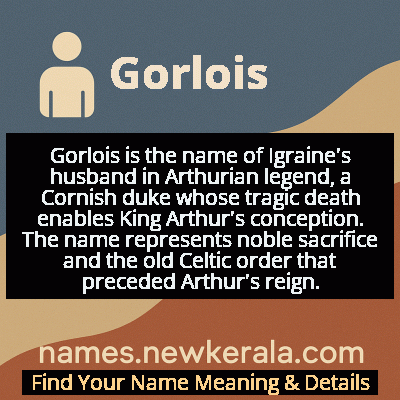Gorlois Name Meaning & Details
Origin, Popularity, Numerology Analysis & Name Meaning of Gorlois
Discover the origin, meaning, and cultural significance of the name GORLOIS. Delve into its historical roots and explore the lasting impact it has had on communities and traditions.
Name
Gorlois
Gender
Male
Origin
Arthurian
Lucky Number
5
Meaning of the Name - Gorlois
Gorlois is the name of Igraine's husband in Arthurian legend, a Cornish duke whose tragic death enables King Arthur's conception. The name represents noble sacrifice and the old Celtic order that preceded Arthur's reign.
Gorlois - Complete Numerology Analysis
Your Numerology Number
Based on Pythagorean Numerology System
Ruling Planet
Mercury
Positive Nature
Adventurous, dynamic, curious, and social.
Negative Traits
Restless, impatient, inconsistent, prone to indulgence.
Lucky Colours
Green, white.
Lucky Days
Wednesday.
Lucky Stones
Emerald.
Harmony Numbers
1, 3, 9.
Best Suited Professions
Sales, marketing, travel, entertainment.
What People Like About You
Versatility, charisma, adventurous spirit.
Famous People Named Gorlois
Gorlois of Cornwall
Arthurian Nobleman
Duke of Cornwall whose death enabled Arthur's conception
Gorlois (Literary Character)
Fictional Noble
Central figure in Arthurian conception mythology
Gorlois (Operatic Character)
Opera Character
Tragic figure in Arthurian musical adaptations
Name Variations & International Equivalents
Click on blue names to explore their detailed meanings. Gray names with will be available soon.
Cultural & Historical Significance
Extended Personality Analysis
Gorlois is consistently portrayed as a noble, honorable, and fiercely protective figure in Arthurian tradition. He demonstrates unwavering loyalty to his wife Igraine and his Cornish domain, embodying the characteristics of a traditional Celtic chieftain—proud, territorial, and bound by strict codes of honor. His decision to hide Igraine in the impregnable Tintagel Castle while he faces Uther's forces at Dimilioc reveals both strategic thinking and a self-sacrificing nature. However, this same protectiveness becomes his tragic flaw, as it creates the perfect circumstances for Uther's magical deception through Merlin's intervention. Gorlois represents the archetype of the honorable but ultimately doomed noble, whose personal virtues cannot withstand the overwhelming forces of destiny and royal ambition. His character illustrates the tension between individual loyalty and the inexorable march of historical change, serving as a poignant reminder that nobility and honor are not always sufficient protection against the schemes of power.
Modern Usage & Popularity
The name Gorlois remains exceptionally rare in contemporary usage, primarily confined to Arthurian scholarship, historical fiction, and specialized communities interested in Celtic mythology. It has never achieved measurable popularity as a given name in English-speaking countries, likely due to its strong association with a tragic figure and its distinctly archaic, Arthurian character. Modern appearances are almost exclusively limited to literary references, character names in Arthurian adaptations, and occasional use within historical reenactment communities. The name's extreme obscurity makes it appealing to a small subset of parents seeking unique mythological names, but its tragic connotations, difficult pronunciation, and strong narrative association have prevented any significant adoption. It exists primarily as a historical and literary artifact rather than a living personal name.
Symbolic & Spiritual Meanings
Gorlois symbolizes the necessary sacrifice that enables great destiny and represents the old order that must fall for new beginnings to emerge. His story carries profound metaphorical weight as the guardian of tradition whose death allows for revolutionary change and the birth of legend. He embodies the tragic nobility of those who stand in the path of historical inevitability, the human cost of royal ambition, and the complex interplay between personal honor and greater cosmic destiny. The name evokes themes of protective love, territorial loyalty, and the bittersweet nature of progress that requires the sacrifice of worthy individuals. Gorlois represents the foundation upon which legends are built—the ordinary nobility that must be transcended for extraordinary destiny to unfold, serving as a permanent reminder that great historical transformations often come at the expense of those who embody the virtues of the passing age.

